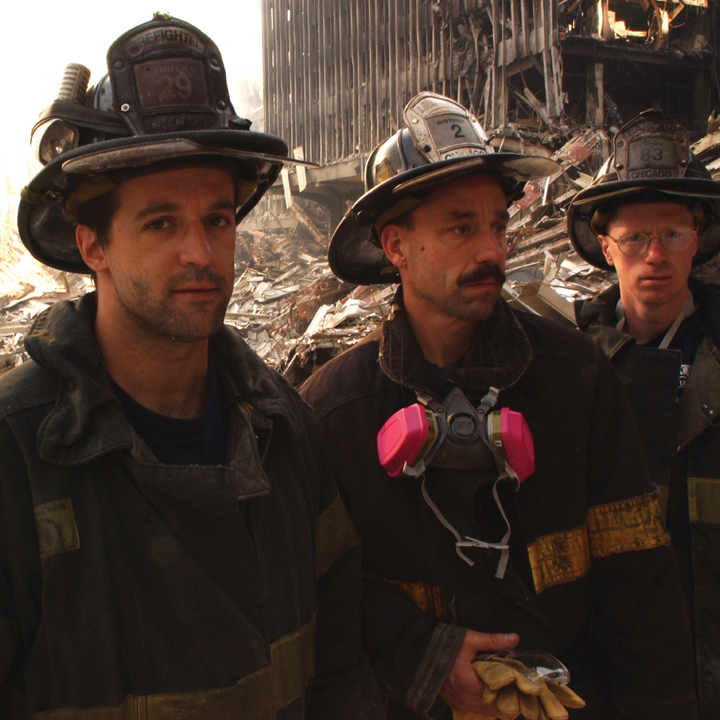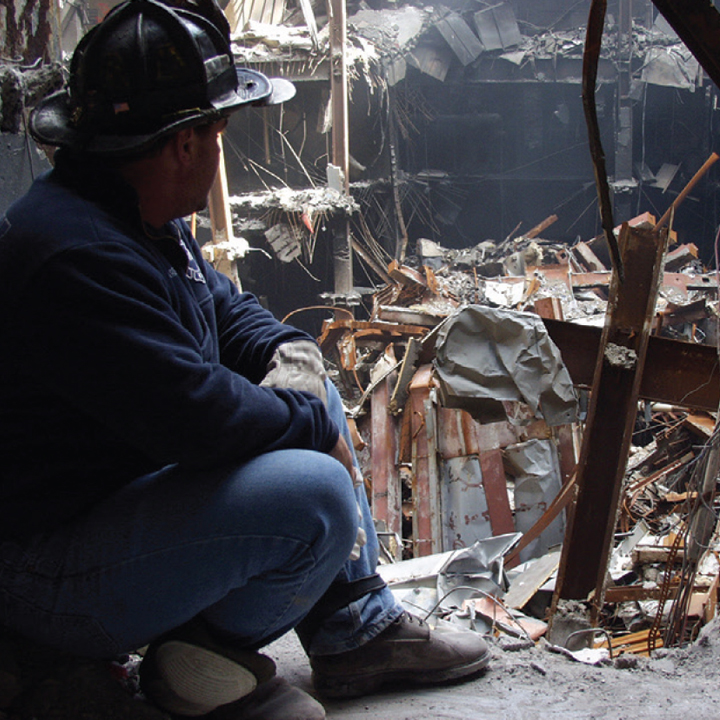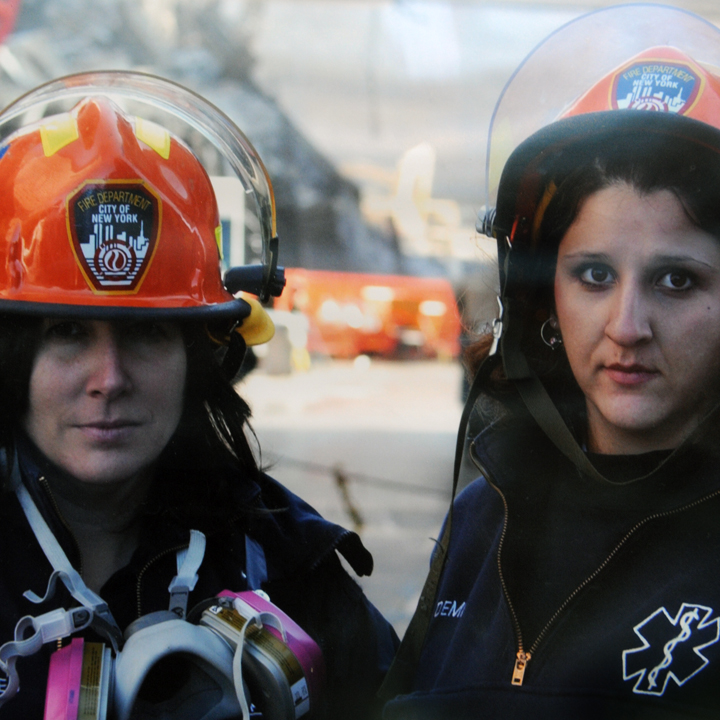Mass Violence Tip Sheets | Responders

Voices Center for Resilience Mass Violence Tip Sheets
Tips for First Responders and Recovery Workers
Responding to a Mass Violence Event
In the aftermath of a tragedy or act of mass violence, responders from various levels of government and other organizations will immediately deploy. This includes, but is not limited to, fire, police, law enforcement, emergency management, medical services, and others who respond on location at the time of the event. The scene of a terrorist attack or other act of mass violence is a crime scene and must be protected as such.
Engaging in a response and recovery effort is stressful, even for those who are well-trained. However, actions can be taken to mitigate the long-term impact on those responding. This document provides recommendations based on what Voices Center for Resilience has learned from working with thousands of responders since 2001.
Considerations for Leaders
It is common for responders to endure intense workloads and long hours with limited resources, often while being separated from their family and support network. They may be exposed to scenes of human remains and suffering, massive destruction, and life-and-death decision making, all while in harm’s way.
Keep in mind there are limits to how many hours the human body can continue to function under these conditions.
- Immediately set up a chain of command
- Implement policies and procedures for logging workers into and out of the disaster site
- Ensure responders have the proper training for their job assignment
- Impose limits to manage responders’ hours so they do not overextend themselves
- Incorporate required breaks into their work schedule
- Provide briefings for workers when they enter the site
- Conduct debriefings at the end of each shift
- Offer mental health support services when needed
- Hire outside law enforcement to manage protocols and security
- Educate responders about department policy regarding interacting with the media and politicians, and be aware of the risks

Voices Center for Resilience Mass Violence Tip Sheets
Managing Responders’ Physical Health
Explosions, fires, and building collapses present unique hazards to first responders, who need to be protected from short- and long-term health effects.
- Provide personal protective equipment
- Provide wash stations and laundry facilities, if appropriate
- Follow decontamination procedures before leaving the site
- Take care not to contaminate respite areas and spaces where food is served
- Ensure communications equipment is functioning properly
Managing Your Workload
Responders often work long hours and have increased responsibilities that require them to work multiple days in the rescue and recovery effort.
- Know the incident command system and protocols
- Familiarize yourself with your roles and responsibilities and ensure you have the proper training to fulfill your duties
- Participate in a daily briefing prior to the beginning of each shift
- Limit shifts to no longer than 12 hours
- Limit the number of consecutive days spent on the site
- Take regular breaks
- Work in teams and limit the amount of time spent working alone
- Create a buddy system and get to know each other’s skills and expertise
- Take time for yourself
- Participate in a daily mental health debriefing at the end of each shift
- Stay connected with your family and friends, and separate your personal life from your work life
- Mentally disconnect from the disaster site as completely as possible during downtime
- Know your personal signs of stress and practice stress management
- Seek professional help if needed

Voices Center for Resilience Mass Violence Tip Sheets
Managing Stress Levels
Responders have a high probability of developing mental health conditions, yet are often the last to seek help for work-related stress. They are especially at risk if they have experienced prolonged separation from loved ones, endured life-threatening situations, or have previously witnessed trauma. The best protection from stress is to be prepared for the job and strengthen stress management skills before responding to a disaster.
Considerations for Leaders
It is critical for leaders to recognize that responders are at high risk for developing mental health conditions and to destigmatize mental health treatment and provide their employees with appropriate support, including:
- Confidential mental health counseling
- Chaplain/spiritual care
- Peer-to-peer support network
- Alternative therapies, such as massage, meditation, or reiki
Tips for Managing Stress
- Know your personal signs of stress
- Plan how you will address major stressors associated with your response to disasters
- Take time for yourself and spend time with family and friends
- Practice healthy sleep behaviors
- Eat nutritiously and avoid excessive junk food, caffeine, and alcohol
- Engage in stress-releasing activities, such as stretching, walking, reading, or listening to music
Seek IMMEDIATE medical attention for any of the following symptoms:
- Chest pain
- Difficulty breathing
- Severe pain
- Symptoms of shock (shallow breathing, rapid or weak pulse, nausea, shivering, pale and moist skin, mental confusion, and dilated pupils)
Seek help if any of these signs persist or become severe:
- Physical effects, such as rapid heart rate, gastrointestinal distress, trouble sleeping, or nightmares
- Strong negative emotions like anger, fear, or deep sadness
- Confusion or disorientation
- Risky behavior, including increased use of alcohol or other drugs
- Social conflicts or isolation

Voices Center for Resilience Mass Violence Tip Sheets
Taking Care of Yourself: Things to Watch For
Vicarious Trauma
If you interact with people who have experienced trauma, you could be at risk for developing what is known as vicarious trauma through your empathetic engagement with traumatized individuals. Symptoms of vicarious trauma are similar to those of PTSD listed above and may also affect your sense of safety, ability to trust, and self-esteem.
Reducing the number of hours you spend working directly with traumatized individuals may help reduce your symptoms. Seek professional help if symptoms persist.
Compassion Fatigue
Over time, some professionals in helping fields may experience an erosion of their emotions in which they begin to lose their ability to feel empathy after hearing or witnessing so many traumatic stories. They start to feel as if they have “nothing left to give,” and may develop a negative world view. This is known as compassion fatigue. Use the coping tips presented in the Mental Health Considerations tip sheet to reduce symptoms, and seek professional help if symptoms persist.
Burnout
Over time, you may grow weary from working in a highly stressful environment. You may feel emotionally exhausted and cynical, and you may lose interest in doing your best work. This is known as burnout. Some warning signs to watch for are:
- Fatigue
- Depression
- Negative feelings about work
- Increased cynicism
- Loss of hope
- Inappropriate sharing of personal material
- Using unhealthy coping skills
- Memory loss
Ways to Prevent Burnout
- Implementing and enforcing policies and procedures to prevent personnel from overworking themselves
- Engaging in positive self-focusing activities (hobbies, journaling, walking, exercise)
- Asking to be reassigned

Voices Center for Resilience Mass Violence Tip Sheets
Additional Considerations
Recognizing Post-Traumatic Stress Disorder
First responders are more likely than the general public to develop PTSD. Seek professional help if these symptoms persist for more than one month:
- Recurring intrusive, distressing memories of the event, flashbacks, and nightmares of the trauma
- Increased arousal and feeling on edge, including inability to sleep, concentrate, or function normally
- Persistent avoidance of all reminders of the trauma
- Feeling detached
- Persistent feelings of anger, fear, guilt, horror, or shame
Training
Studies from previous disasters have shown that being well-trained helps to protect responders’ psychological well-being and resilience. Responders should have training in the following areas, as appropriate for their role, prior to being assigned to a mass violence response
- Identifying victims
- Conducting compassionate death notifications
- Securing a crime scene
- Protecting evidence and the chain of custody
- Apprehending a suspect
- Rendering first aid
VOICES Support - Phone: 203-966-3911; Email: support [at] voicescenter.org (Support[at]VoicesCenter[dot]org)
VOICES Mission - From 9/11 to today, Voices Center for Resilience assists communities in preparing for and recovering from tragedy, and provides long-term support and resources that promote mental health care and wellness, for victims’ families, responders and survivors.
